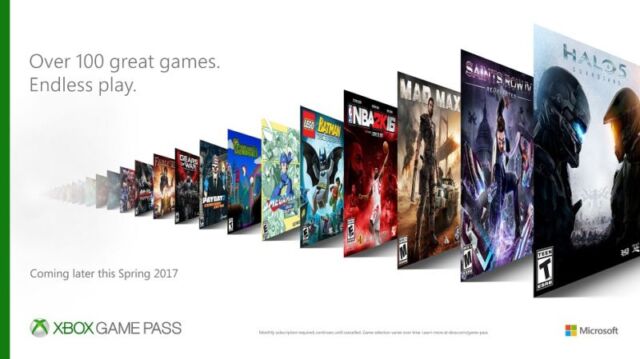
Getty Images
For years, Microsoft’s Xbox Game Pass has distinguished itself by giving subscribers access to new first-party titles at launch, in addition to a vast library of older games. That important “day one” perk is now set to disappear for all but the highest tier of Game Pass subscribers, even as Microsoft demands more money for Game Pass across the board.
Let’s start with the price increases for existing Game Pass tiers, which are relatively straightforward:
- “Game Pass Ultimate” is going from $16.99 to $19.99 per month.
- “Game Pass for PC” is going from $9.99 to $11.99 per month.
- “Game Pass Core” (formerly known as Xbox Live Gold) is increasing from $59.99 to $74.99 for annual subscriptions (and remains at $9.99 for monthly subscriptions).
Things get a little more complicated for the $10.99/month “Xbox Game Pass for Console” tier. Microsoft has announced that it will no longer accept new subscriptions for this tier after today, but current subscribers will be able to keep it (for now) if they auto-renew their subscriptions.
Instead, Microsoft will launch a new $14.99 “Xbox Game Pass Standard” bundle “in the coming months.” This new option will combine the usual access to “hundreds of high-quality console games” with the “online multiplayer on console” features that previously required a separate Xbox Game Pass Core subscription (“Core” will still be available separately and will include access to a smaller library of “25+ games”).
Quick and simple table from me to show the new Xbox Game Pass structure (subject to correction).
I hope this helps. pic.twitter.com/Qj6CX7i4kG
– Klobrille (@klobrille) July 10, 2024
But while the current Xbox Game Pass Console option promises access to Xbox Game Studios games “the same day they launch,” these “Day One releases” are noticeably absent as a perk for the replacement Xbox Game Pass Standard subscription.
“Some games available with Xbox Game Pass Ultimate on day one will not be immediately available with Xbox Game Pass Standard and may be added to the library at a later date,” Microsoft writes in an FAQ explaining the changes.
Players who want guaranteed access to all of these “Day One” releases will now have to subscribe to Game Pass Ultimate at $19.99/month. That’s an 81% increase over the $10.99/month that console players currently pay for similar “Day One” access on the disappearing Game Pass Console tier.
To be fair, that extra subscription does come with a few extra perks. Upgrading from Game Pass Console/Standard to Game Pass Ultimate gets you Microsoft’s cloud gaming service, access to downloadable PC games and the EA Play library, and “additional free perks every month.” But it’s the launch-day access to top-selling first-party titles on Microsoft’s system that really sets the Ultimate tier apart now, and will likely require a costly upgrade for many Xbox Game Pass subscribers.
No more problems, no more money

Although Xbox Game Pass launched in 2017, launch-day access to all of Microsoft’s new first-party games wasn’t promised to subscribers until early 2018. Since then, loyal Game Pass subscribers have been able to play dozens of new first-party titles at launch, from major franchises like Halo, StrengthAnd War weapons to indie darlings like Rush to high fidelity, Sea of ThievesAnd Ori and the Will of the Wisps and much more.
Sure, access to hundreds of older games was nice. But the promise of new, top-tier titles helped turn Xbox Game Pass into a service that had 34 million subscribers as of February. And Sony found itself reluctant to offer that “day one” benefit to its similar PlayStation Plus service, which only includes a handful of older PlayStation Studios titles.
In a 2022 interview with GamesIndustry.biz, PlayStation CEO Jim Ryan said that adding new first-party games to their subscription service would break a “virtuous cycle” in which new purchases of full games (at prices of up to $70) help fund the next phase of game development. “The level of investment that we have to make in our studios would not be possible, and we think that the domino effect on the quality of the games that we create would not be something that players want.”
And Microsoft may well be coming to a similar conclusion. Including first-party titles in cheaper, console-focused Game Pass subscriptions probably seemed like a good idea when Microsoft was still trying to attract subscribers to its service. But Game Pass’s subscriber growth is starting to slow as the market for potential customers has become saturated. Microsoft now needs to extract more value from those subscribers to justify Game Pass cannibalizing direct sales of its own first-party games.
Activision
And let’s not forget Activision, which Microsoft recently acquired for $69 billion after lengthy legal and regulatory battles. Recouping that cost, while giving Game Pass subscribers launch-day access to massive sales like Call of Dutylikely forced Microsoft to maximize Game Pass’ revenue-generating opportunities.
“Let’s put it this way: If 7 million Xbox Game Pass subscribers were planning to buy Call of Duty for $70 but now have no reason to (since it’s part of their subscription), that leaves nearly half a billion dollars in revenue on the table,” MIDia analyst Rhys Elliott told The Daily Upside to illustrate the big numbers involved.
For gamers who enjoy a wide variety of games and would likely buy all or most of Microsoft’s first-party titles at launch anyway, Xbox Game Pass Ultimate is likely still a good deal at its increased price. But gamers who signed up for a relatively cheap console Game Pass option years ago might want to reevaluate whether maintaining that access on launch day is now worth $240 per year.